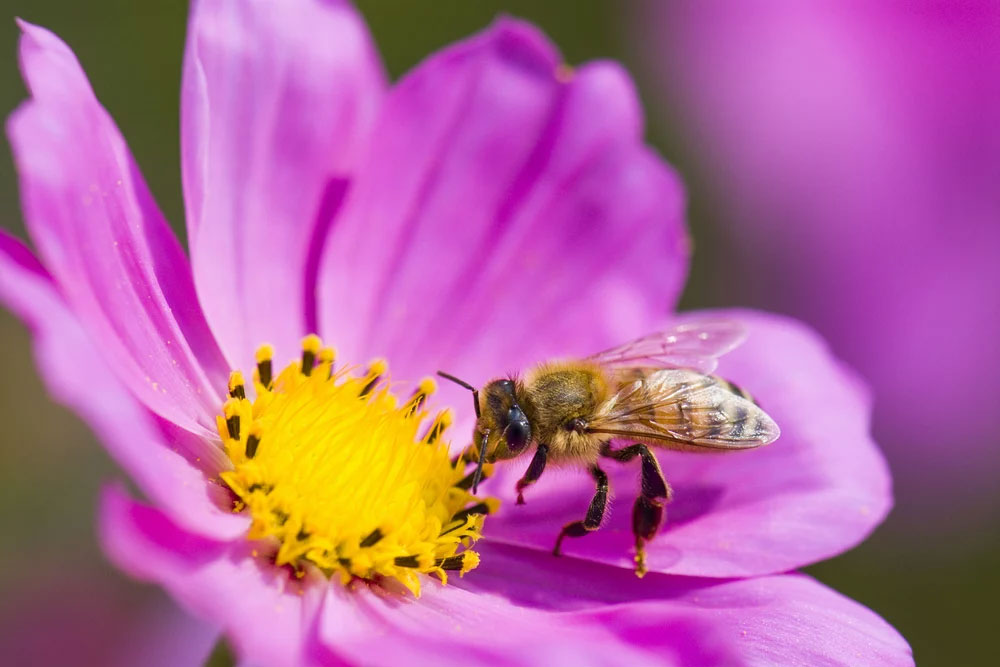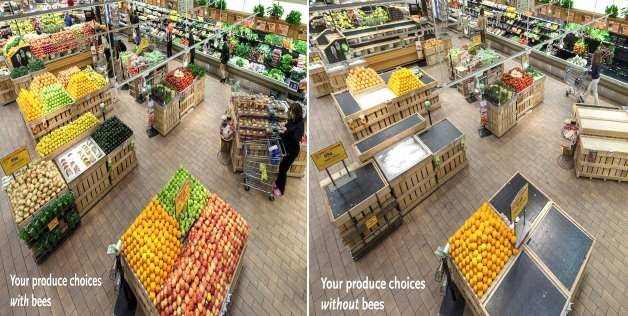By: Courtney Rau, FNP-C – Wiseman Family Practice
Summer is here in Central Texas, however, a familiar and essential lifeform is rapidly vanishing. One third of the US food supply is dependent on the pollination of crops by bees. Without bees, a majority of the fruits, vegetables, nuts, and seeds we eat would not exist.
The Disappearance of Bees
The population of honey bee hives has decreased by half since the 1940s despite an increased demand for pollination. This worldwide death of bees is being linked to a phenomenon called Colony Collapse Disorder defined as “a dead bee colony with no adult bees, or a colony with a live queen and only immature bees present.”

One suspected cause is linked to the wide use of seeds treated with nicotinoids, which are forms of pesticides and insecticides that attack the central nervous system of pests. Though bees are not the target of these insecticides, the chemicals are transferred into pollen and nectar and ingested by the bees. Manufacturers including Monsanto, DuPont, and Dow, have refused to discontinue distribution of these treated seeds despite growing evidence of their connection to the Colony Collapse Disorder. Though many European countries have banned the use of nicotinoids, the Environmental Protection Agency has allowed these forms of insecticides to be used. Only recently has the EPA announced they will no longer allow applications for new uses of neonicotinoid pesticides without the completion of pollinator risk assessments. The full letter sent to registrants can be read on the EPA website. For more information about the disappearance of bees and the Colony Collapse Disorder, you can view the documentary film, The Vanishing of the Bees.
How You Can Help
- Plant a Bee-Friendly Garden
-
- Use Local Native Plants. The Lady Bird Johnson Wildflower Center, Xerces Society, and Pollinator Partnership have provided an extensive list of pollination supportive plants. You can also download a free iPhone and Android app from the Pollinator Partnership to determine which plants are most appropriate for your garden. The garden at Wiseman Family Practice features a variety of bee-friendly plants including strawberries, honeysuckle, and herbs.
- Choose Bright Colored Flowers. Bees are attracted to shades of blue, purple, violet, pink, white, and yellow.
- Plant Flowers in Clusters. Planting in clusters will attract more bees than plants that are spread out throughout a garden.
- Choose Plants with Varying Shapes. Different bees will feed on different shaped flowers. Providing variation encourages attraction of a diversity of species.
-
- Support Local Beekeepers and Farmers. Austin is home to many local beekeepers and honey distributors. We encourage you to visit your local farmer’s markets and businesses to discover more vendors.
- Become An Amateur Beekeeper. If you are interested in beekeeping on your own property, hives and bees can be purchased from local beekeepers like Bee Weaver.
- Support Bee Preservation Efforts and GMO Labeling.
- Friends of the Earth has launched a national campaign to ban neonics and save the bees by providing opportunities to sign petitions and contribute financially to global efforts.
- The Organic Consumer Organization is a non-profit, public interest organization dealing with “the crucial issues food safety, industrial agriculture, genetic engineering, children’s health, corporate accountability, Fair Trade, environmental sustainability and other key topics.”
- Austin Tour De Hives will be held Saturday, August 15th. This will be a self-guided tour of the many bee yards in Austin starting at the Bee Friendly Austin Apiary. Bring your family and learn about the many ways our local residents are supporting bee preservation.
- Austin’s Mayor Steve Adler will declare August 26th as Honeybee Awareness Day. The proclamation ceremony will be held Thursday, August 6th at 5:30pm at Austin City Hall.
- Mercola, J. (2013, June 8) Beekeeping Industry ‘Doomed’ — Might We See Destruction of Food Supply Before the End of This Decade?. Articles.Mercola.com. Retrieved June 19, 2015.
- Mercola, J. (2015, May 26) US Honeybee Losses Soar Over Last Year, USDA Finds. Articles. Mercola.com. Retrieved June 19, 2015.
- Produce Image Source: GMO Insider
- Flower Image Source: Andrew Reyna


We have an apiary in Georgetown, so we are well aware of the issues. thank you for bringing this to your patients.
Very informative article! Thanks for sharing with us Ms. Courtney!